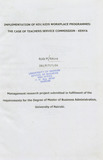| dc.contributor.author | Katuva, Roda M | |
| dc.date.accessioned | 2018-08-31T08:15:55Z | |
| dc.date.available | 2018-08-31T08:15:55Z | |
| dc.date.issued | 2006 | |
| dc.identifier.uri | http://hdl.handle.net/11295/103830 | |
| dc.description.abstract | The HIV/AIDS epidemic has become a great challenge in any workplace and especially as far as human resource management is concerned. Many business managers have previously been apathetic about HIV/AIDS despite the devastation that the epidermic has wrecked in workplaces through absentism, loss of productivity and rising health care cost. Some organization barring certain exceptions, have either maintained silent on it or have been reactant in providing resources for HIV interventions in the form of HIV/AIDS work programmes.
The objective of this study was therefore to establish any such interventions at Teachers Service Commission (TSC) which a public sector organization employing the largest workforce in Kenya. It also intended to establish the challenges the TSC faces in implementation of these programmes. The workforce is distributed countrywide hence the implementation of these programmes is bound to face a diversity of issues.
The study established that the TSC has formulated and implemented several HIV/AIDS workplace programmes including peer support, counselling, management support skills and advocacy aimed at mitigating the impact of the epidemic on the TSC. The TSC has however faced a number of challenges in the implementation of the programmes . Stigma and discrimination of these infection of those infected with HIV especially by school manager has hampered successful sensitization of all that are targeted. Besides this funding for the successful implementation of the programmes is not adequate thus the programmes are not able to reach all the enteded.
The study recommeded tha the government and other donor organization increase their support for HIV and AIDS workplace programmes. There should be increased involvement of the beneficiaries of such programmes in their formulation in order to ensure wide acceptance and support. Organizational leadership and involvement also critical in prevention and care
of the infected and affected employees in and organization. Government as employers need also to increase their finding for HIV and AIDS programmes at the workplace considering the wide dispersion of the employees. | English |
| dc.language.iso | en | en_US |
| dc.publisher | University of Nairobi | en_US |
| dc.rights | Attribution-NonCommercial-NoDerivs 3.0 United States | * |
| dc.rights.uri | http://creativecommons.org/licenses/by-nc-nd/3.0/us/ | * |
| dc.subject | HIV I Aids Workplace Programmes | en_US |
| dc.title | Implementation of Hiv/Aids Workplace Programmes: the Case of Teachers Service Commission - Kenya | en_US |
| dc.type | Thesis | en_US |



